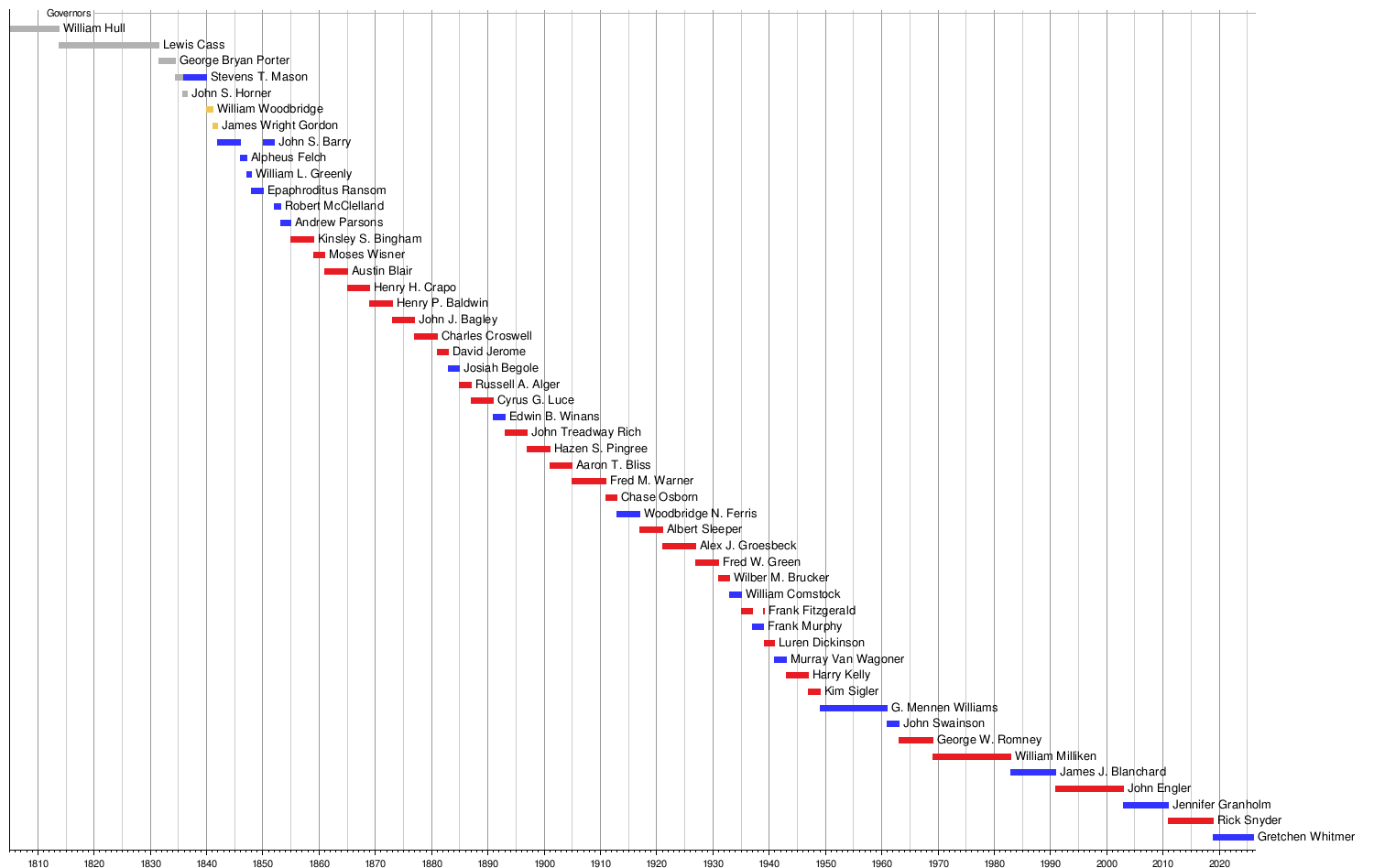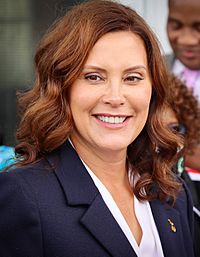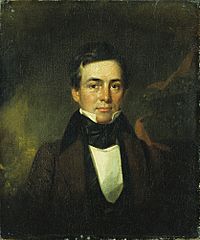Governor of Michigan facts for kids
Quick facts for kids Governor of Michigan |
|
|---|---|

Standard of the governor
|
|

Seal of the governor
|
|
| Government of Michigan | |
| Style | Her Excellency The Honorable |
| Residence | Michigan Governor's Mansion |
| Term length | Four years, renewable once |
| Precursor | Governor of Michigan Territory |
| Inaugural holder | Stevens T. Mason |
| Formation | November 3, 1835 |
| Succession | Line of succession |
| Deputy | Lieutenant Governor of Michigan |
| Salary | $159,300 per year |
The governor of Michigan is the main leader of the state government in Michigan. Think of them as the "boss" of the state. The current governor is Gretchen Whitmer. She is part of the Democratic Party. She started her first term on January 1, 2019. She was re-elected in 2022 for a second term. A governor serves for four years. They can only serve two terms in total.
Contents
Becoming Governor: What It Takes
To become the governor of Michigan, a person needs to meet a few requirements. These rules also apply to the lieutenant governor.
Who Can Be Governor?
- You must be a United States citizen.
- You need to have lived in Michigan and been able to vote for at least four years before the election.
- You must be at least 30 years old.
- Since 2010, if someone has been found guilty of a serious crime involving dishonesty or cheating while in a government job, they cannot run for governor or any other elected office.
Elections and How Long a Governor Serves
The way governors are elected and how long they serve has changed over time.
How Elections Work
From when Michigan became a state until 1966, governors were elected for two-year terms. Elections happen in November. The new governor starts their job the following January. This is unless something unexpected happens, like the governor passing away or resigning.
Before 1851, elections were held in odd-numbered years. A new state constitution was made in 1850. It changed the election schedule. For one year in 1851, there was a special one-year term for the governor. After that, elections were held in even years.
Term Length Changes
The state constitution adopted in 1963 changed the governor's term to four years. This started with the 1967 election. Since then, Michigan's governor elections happen two years after the U.S. presidential elections. For example, if a presidential election was in 2008, the Michigan governor election was in 2010. The winner of the governor election officially takes office at noon on January 1st of the year after the election.
Term Limits Explained
Before 1992, governors could serve as many terms as they wanted. But in 1992, a new rule was added to the Michigan constitution. It set a limit of two four-year terms for the governor. These terms can be served one after another or at different times.
However, only terms served after this rule started counting towards the limit. So, John Engler, who was governor at the time, served three terms. His first term didn't count towards the new limit. He was re-elected in 1994 and 1998. He had to leave office in 2002 because he reached his two-term limit under the new rule.
What the Governor Does: Powers and Duties
The governor of Michigan has many important jobs and responsibilities. They help run the state and make sure laws are followed.
Key Responsibilities
- They can sign new laws passed by the state legislature. They can also say "no" to a law, which is called a veto. They can even veto just parts of a spending bill.
- They can change how state government agencies and departments are organized.
- They choose most of the leaders for state departments. The state Senate must agree with these choices.
- They appoint judges, but voters later decide if those judges should stay.
- They choose people to serve on various state boards and commissions.
- They suggest a plan for the state's budget, which is how the state will spend its money.
- They give an annual State of the State address. This speech tells everyone how Michigan is doing and what the governor plans to do.
- They can take legal action against other government leaders if they are not following the law.
- They are in charge of the state's military forces, called the militia.
- They can grant pardons for most crimes. This means they can forgive someone for a crime. However, they cannot do this if the person was removed from office through a process called impeachment.
The governor also chooses members for the boards that run 10 of Michigan's 13 public universities. They also appoint members to department commissions.
History of Michigan's Governors
Michigan has had many governors since it became a state.
Forty-seven different people have served as governor of Michigan. Two of them, John S. Barry and Frank Fitzgerald, served terms that were not one after another. Before Michigan became a state, there were five governors of the Michigan Territory.
Stevens T. Mason was Michigan's very first state governor. He had also been a territorial governor. He was elected governor when he was only 23 years old in 1835. He was a member of the Democratic Party. He served until 1840. Mason was the youngest state governor in the history of the United States.
Jennifer Granholm made history on January 1, 2003. She became the first female governor of Michigan. She took over after John Engler. She served for 8 years, until January 1, 2011.
Timeline
| Timeline of Michigan governors |
 |
See also
 | Anna J. Cooper |
 | Mary McLeod Bethune |
 | Lillie Mae Bradford |



